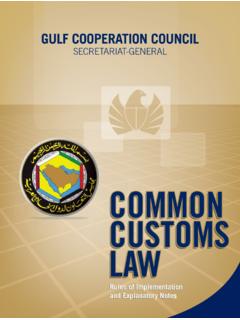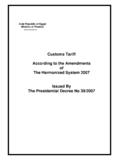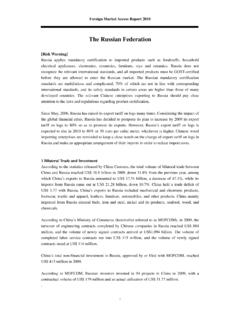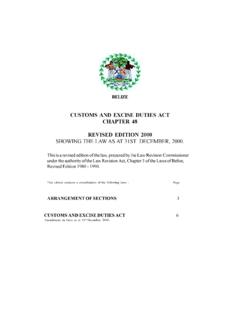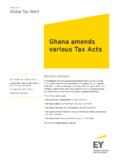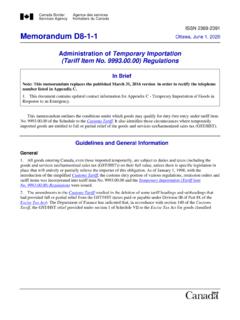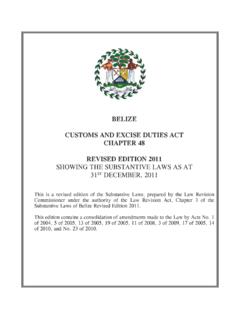Transcription of COMMON CUSTOMS LAW - جمارك دبي
1 COMMON CUSTOMS LAW1 GULF COOPERATION COUNCILSECRETARIAT-GENERALCOMMONCUSTOMSL AWCOMMONCUSTOMSLAWR ules of Implementationand Explanatory NoteRules of Implementationand Explanatory NotesCOMMON CUSTOMS LAW5 The unification of the CUSTOMS regulations and procedures in the GCC Member States is one of the most important objectives to be achieved by the CUSTOMS administrations of the GCC Member States among which is the adoption of a COMMON CUSTOMS Law that unifies the CUSTOMS procedures in all the CUSTOMS administrations of the GCC Member States and contributes to the enhancement of cooperation in the CUSTOMS field among the Member efforts to achieve this objective had been made since 1992 and the techni-cal committee, assigned by the directors general of CUSTOMS , to do this task had held seventeen meetings for this purpose and concluded with the agreement on the Law referred to ensure that this Law is in line with the provisions of the international organiza-tions relating to CUSTOMS , the Secretariat General had dispatchedEnglish versions of this Regulation to the World Trade Organization and theWorld CUSTOMS Organization for their comments and the Secretariat General received those comments which were passed to the competent technical com-mittee for consideration and proposing appropriate COMMON CUSTOMS Law of the GCC Member States was adopted by theSupreme Council at the 20th Session (Riyadh, 27-29 November 1999)
2 To be implemented as a reference law for one year from the date adopted by the Su-preme Council and to be revised in the light of the comments received by the Secretariat General from the Member States in an attempt to have it compulso-rily implemented by all the CUSTOMS Administrations of the GCCM ember States by CUSTOMS LAW6In order to complete the necessary implementation aspects of the COMMON CUSTOMS Law in the CUSTOMS administrations of the GCC Member States and to review the comments of the member States and finalize the preparation of the Rules of Implementation and the Explanatory Notes, the Supreme Council, at its 21st Session held in Manama, Bahrain 30-31 December 2000, decided to extend the reference implementation of the COMMON CUSTOMS Law for one more year provided that it should be obligatorily implemented by all the CUSTOMS Administrations of the GCC Member States as of January said decision resolution of the Supreme Council was a step that had enabled the CUSTOMS administrations and the ad hoc committees of the GCC Member States to complete all the aspects that would provide the factors of the proper implementation of this Law to achieve the intended objective, that is the unification and facilitation of the CUSTOMS procedures in the GCC Member States which would enhance Intra-GCC trade and external trade with the rest of the world.
3 And lay down the firm foundations of the GCC CUSTOMS to the recommendation of the Ministerial Council, at its 81stPreparatory Session, to adopt the recommendation of the Financial and Eco-nomic Cooperation Committee (The Ministers of Finance and Economy of the GCC Member States) at its 55th Meeting concerning the GCC COMMON CUSTOMS Law, the Supreme Council, at its 22nd Session held in Muscat on 30-31 Decem-ber 2001, resolved as follows:Approval of the amendments proposed to the GCC COMMON CUSTOMS Law , the Rules of Implementation and the Explanatory Notes thereof. This Law shall come into force as of January 2002. Implementation of Articles (9, 98) relating to the COMMON CUSTOMS Tariff and the mechanism for the collection and distribution of duties in the CUSTOMS union of the GCC Member States shall synchronize with the setting up of the CUSTOMS union.
4 Article (97) relating to drawback the refund of the CUSTOMS taxes duties on the goods re-exported to outside of the GCC Member States shall be implemented after the issuance of the rules of implementation thereof. Provisions of Article (109) entitling the GCC citizens the right to engage in the COMMON CUSTOMS LAW7activity of CUSTOMS clearance shall be implemented after the Financial and Eco-nomic Cooperation Committee has agreed to permit the GCC nationals to engage in this activity in the GCC Member States. The Supreme Council, at its 23rd Session held in Doha, Qatar 21-22 December 2002, approved the decisions of the Financial and Economic Cooperation Com-mittee concerning the application of Article (9) Implementation of the COMMON CUSTOMS Tariff , Article (97) Drawback ,Article (98) Goods exempted from the CUSTOMS taxes duties and Article(109) permitting the GCC citizens to engage in the activity of CUSTOMS Law falls in (17) sections comprising (178)
5 Articles containing provisions regulating the CUSTOMS work, the areas subject to CUSTOMS control, the nature of the CUSTOMS procedures at the land, sea , air and post CUSTOMS offices that apply to the import and export operations, the application of the CUSTOMS tariff and the collection of the CUSTOMS duties on the imported goods, the stages of the cus-toms clearance of the goods, the exemptions and temporary admission of goods, the documents to be produced to CUSTOMS for the clearance of the goods, and the provisions for the establishment of free zones and duty-free shops and the regulation of the work of the CUSTOMS brokers (clearing agents), the treatment of the CUSTOMS offences and the smuggling cases and the rights and duties of the CUSTOMS officers. Hence, this law is deemed as the legal tool regulating the CUSTOMS procedures in the CUSTOMS administrations of the GCC Member States as well as the relationship between these administrations and the community of citizens, residents and importers so that the person dealing with the CUSTOMS administrations would find no difference in the CUSTOMS procedures applied in any of the GCC Member States.
6 This law does also govern the relationship between these CUSTOMS administrations and the government departments in each Member this Law had been prepared, it was taken into account that it would be utilized in the CUSTOMS work for the time being and it would also prepare the CUSTOMS administrations of the Member States for the forthcoming phase of the GCC CUSTOMS Union as it meets all requirements CUSTOMS LAW8 COMMON CUSTOMS LAW9 IntroductionSection I: General Provisions and DefinitionsSection II: Principles for Application of the CUSTOMS TariffSection III: Prohibition and RestrictionSection IV: Distinguishing Elements of the GoodsSection V: Importation and ExportationChapter I - Importation:Marine (sea) Transport. Land Transport. Air Transport Chapter II - ExportationChapter III - Postal TrafficChapter IV - COMMON ProvisionsSection VI: Stages of the CUSTOMS ClearanceChapter I - CUSTOMS DeclarationsChapter II - Inspection (examination) of GoodsChapter III - Provisions relating to PassengersChapter IV - Adjustment of PricesChapter V - Payment of the CUSTOMS taxes duties and the release of of ContentsCOMMON CUSTOMS LAW10 Section VII: Cases where CUSTOMS duties and taxes are suspended:Chapter I - General ProvisionsChapter II Goods in TransitChapter III - WarehousesChapter IV - Free Zones and Duty-Free ShopsChapter V - Temporary AdmissionChapter VI - Re-exportationChapter VII - DrawbackSection VIII.
7 ExemptionsChapter I - Commodities exempted from CUSTOMS duties and taxesChapter II - Diplomatic exemptionsChapter III - Military exemptionsChapter IV - Personal effects and household appliancesChapter V Imports by the philanthropic societies (charities)Chapter VI- Returned goodsChapter VII - COMMON ProvisionsSection IX: Service Fees and ChargesSection X: CUSTOMS BrokersSection XI: Rights and duties of the CUSTOMS officersSection XII: CUSTOMS Zone (Territory) COMMON CUSTOMS LAW11 Section XIII: CUSTOMS Matters (cases)Chapter I: Detection (investigation) of smugglingChapter II: Seizure ReportChapter III: Precautionary (Provisional) MeasuresPart 1: Precautionary (Provisional) seizurePart 2: Preventing the offenders and the accused persons from leaving the countryChapter IV: CUSTOMS offences and penalties thereofChapter V: Smuggling and Penalties thereof:Part 1: SmugglingPart 2: Penal liabilityPart 3: PenaltiesChapter VI: Prosecutions (pursuits):Part 1: Administrative ProsecutionsPart 2: Judicial prosecution of the smuggling offencesPart 3: Devolution of the right of prosecution and conciliatory settlement (compromise).
8 Chapter VII: Liability and Joint liabilityChapter VIII: Rules of Court proceduresSection XIV: Sale of GoodsSection XV: Privilege of the CUSTOMS AdministrationSection XVI: PrescriptionSection XVII: Final ProvisionsRules of Implementation of the COMMON CUSTOMS Law:I. The value of goods for CUSTOMS Temporary admissionIII. Re-exportation of goodsIV. Exemption of the personal effects and gifts accompanying the PassengersExemption of the philanthropic societies charities from the customstaxes duties . VI. Goods subject to the provisions of the CUSTOMS zone Territory and conditions of transport Fines imposed on the CUSTOMS IGeneral Provisions and DefinitionsCOMMON CUSTOMS LAW14 Section IGeneral Provisions and DefinitionsArticle 1 This regulation (law) is called The COMMON CUSTOMS Law for the Arab States of the Gulf (GCC Sates).
9 Article 2 The following words and terms, wherever mentioned throughout this Regulation Law , its Explanatory Note and Rules of implementation, shall have the meanings hereby assigned for them, unless the context otherwise requires:1. the Council means the Cooperation Council for the Arab States of the Gulf. 2. the Minister means the minister to whom the CUSTOMS Administration reports. 3. The competent authority means the authority to which the CUSTOMS administration reports. 4. The Director General means the Director General of CUSTOMS . 5. The Director means the director of a CUSTOMS office. 6. Administration means the CUSTOMS Administration. 7. CUSTOMS office means the sector, designated by the Minister, at each seaport, airport, and land port or at any other place where there is a branch office of the Administration authorized to complete all or some of the CUSTOMS procedures.
10 8. Regulation / law means the rules and provisions governing CUSTOMS work, and any other supplementing or amending rules or provisions. 9. CUSTOMS zone/territory means that part of the lands or seas subject to the CUSTOMS control and procedures set forth herein which is of two kinds: COMMON CUSTOMS LAW15(i). Sea CUSTOMS zone: Which includes that part of the sea located between the shores and the end boundary of the territorial waters.(ii) Land CUSTOMS zone: which covers the lands located between the land boundaries or shores, on the one hand, and the internal lineon the other hand, to be prescribed by a resolution by the Minister or the competent authority?10. CUSTOMS line means that line conforming to the political boundaries (borders) separating between the country and the adjacent countries and the seashores surrounding that country.
